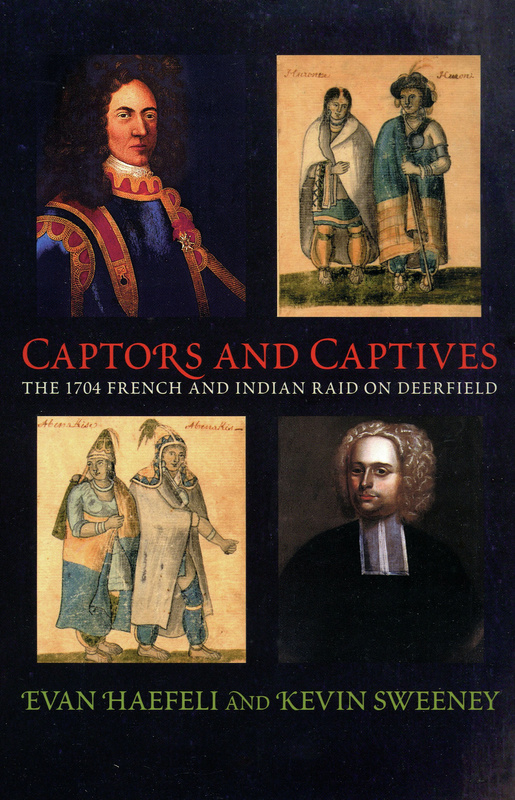Captors and Captives
The 1704 French and Indian Raid on Deerfield
By Evan Haefeli and Kevin Sweeney
University of Massachusetts Press
On February 29, 1704, a party of French and Indian raiders descended on the Massachusetts village of Deerfield, killing fifty residents and capturing more than a hundred others. In this masterful work of history, Evan Haefeli and Kevin Sweeney reexamine the Deerfield attack and place it within a framework stretching from the Atlantic Ocean to the Great Lakes. Drawing on previously untapped sources, they show how the assault grew out of the aspirations of New England family farmers, the ambitions of Canadian colonists, the calculations of French officials, the fears of Abenaki warriors, and the grief of Mohawk women as they all struggled to survive the ongoing confrontation of empires and cultures.
Haefeli and Sweeney reconstruct events from multiple points of view, through the stories of a variety of individuals involved. These stories begin in the Native, French, and English communities of the colonial Northeast, then converge in the February 29 raid, as a force of more than two hundred Frenchmen, Abenakis, Hurons, Kahnawake Mohawks, Pennacooks, and Iroquois of the Mountain overran the northwesternmost village of the New England frontier. Although the inhabitants put up more of a fight than earlier accounts of the so-called Deerfield Massacre have suggested, the attackers took 112 men, women, and children captive. The book follows the raiders and their prisoners on the harsh three-hundred-mile trek back to Canada and into French and Native communities. Along the way the authors examine how captives and captors negotiated cultural boundaries and responded to the claims of competing faiths and empires—all against a backdrop of continuing warfare.
By giving equal weight to all participants, Haefeli and Sweeney range across the fields of social, political, literary, religious, and military history, and reveal connections between cultures and histories usually seen as separate.
Haefeli and Sweeney reconstruct events from multiple points of view, through the stories of a variety of individuals involved. These stories begin in the Native, French, and English communities of the colonial Northeast, then converge in the February 29 raid, as a force of more than two hundred Frenchmen, Abenakis, Hurons, Kahnawake Mohawks, Pennacooks, and Iroquois of the Mountain overran the northwesternmost village of the New England frontier. Although the inhabitants put up more of a fight than earlier accounts of the so-called Deerfield Massacre have suggested, the attackers took 112 men, women, and children captive. The book follows the raiders and their prisoners on the harsh three-hundred-mile trek back to Canada and into French and Native communities. Along the way the authors examine how captives and captors negotiated cultural boundaries and responded to the claims of competing faiths and empires—all against a backdrop of continuing warfare.
By giving equal weight to all participants, Haefeli and Sweeney range across the fields of social, political, literary, religious, and military history, and reveal connections between cultures and histories usually seen as separate.
In Captors and Captives, historians Evan Haefeli of Tufts University and Kevin Sweeney of Amherst College have produced an impressive account that explores the raid from the conflicting viewpoints of the raiders, both French-Canadian and Native American, and the Deerfield villagers—as well as its place in the century-long conflict between the two colonial empires.'—Boston Sunday Globe
'In sum, Evan Haefeli and Kevin Sweeney have written an exceptionally well-researched, engaging, and cogent book. Captors and Captives is sure to become the standard account of the 1704 raid, likely to withstand the scrutiny of antiquarians and professional historians alike. The authors' meticulous research has uncovered new insights about a story that has been told and retold for three centuries. They have also expertly situated Deerfield with the historiographies of New England, New France, and Native America, suggesting new directions for each of these vibrant and complex subfields. If Jean-Baptiste Hertel de Rouville accomplished the extraordinary by approaching Deerfield with so formidable and diverse an arsenal, Haefeli and Sweeney's book is a fitting commemorative for the event, for they have done the same.'—Reviews in American History
'A definitive new account of the raid. . . . The authors reconstruct the events surrounding the raid from multiple points of view. They also explore the motivations of the various players, from Paris to Boston.'—The New York Times
'I suspect that no one alive knows more about the 1704 Deerfield raid than Sweeney and Haefeli. Their evenhanded ability to bring both intense archival research and the latest historiography to bear on Native Americans, French habitants, and Deerfield residents is truly impressive.'—Daniel K. Richter, author of Facing East from Indian Country:
A Native History of Early America
'The most sophisticated treatment of the raid I have seen. The book does a tremendous job of tracing and connecting individual lives to demonstrate the fluidity of community and boundary, and wears its painstaking research lightly.'—Colin G. Calloway, author of The American Revolution in Indian Country:
Crisis and Diversity in Native American Communities
'Captors and Captives is highly engaging because it crosses so many geographical, social, and cultural boundaries and cuts across many of the specializations within the field of early American history. . . . With is clear prose and uncomplicated organization—the book remains free of heavy theory while its authors confine a lot of the hard work of the social historian to appendixes and maps—Captors and Captives should be accessible to undergraduates and a popular reading audience. This book, the end result of a partnership between two fine historians, is the definitive study of the 1704 French and Indian raid on Deerfield.'—American Indian Culture Research Journal
'Captors and Captives is ethnohistory at its finest—a detailed examiniation of all sides of the frontier and the connections that held them together.'—Journal of British Studies
'test'—
Evan Haefeli is assistant professor of history at Tufts University. Kevin Sweeney is professor of history at American Studies at Amherst College.









